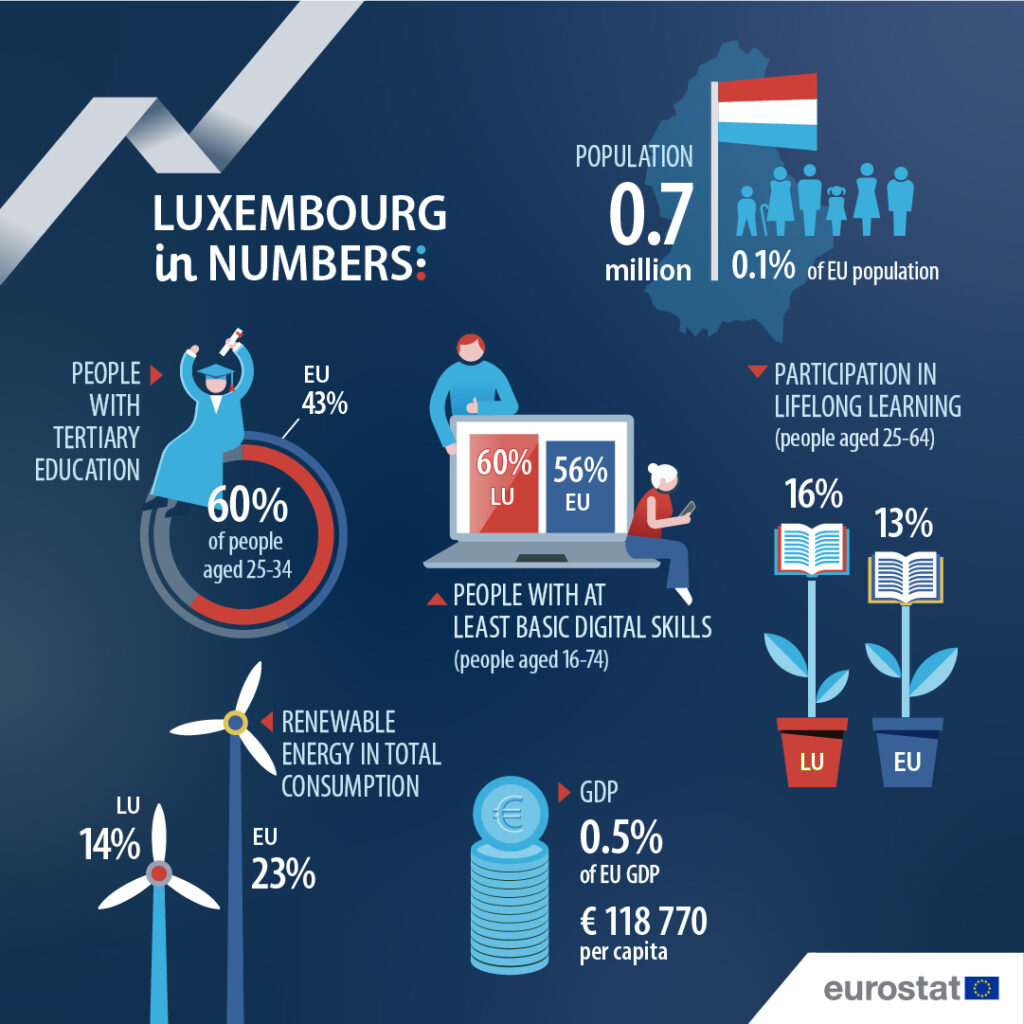Luxembourg in Numbers – 2024
26 July 2024

Discover key facts and figures about Luxembourg
Eurostat has published a new “Luxembourg in Numbers” infographic to share some interesting figures about the nation. Discover the infographic below along with further details to shed light on each figure.

Luxembourg’s Population growth and robust GDP
While Luxembourg’s population of around 670,000 represents 0.1% of the EU’s population, it accounts for 0.5% of the EU’s GDP. Luxembourg’s GDP ‘punches above its weight’ thanks in part to its favourable working conditions, which attract an estimated 228,000 cross-border commuters from Belgium, France and Germany who contribute to the country’s economic growth.
Looking more closely, Luxembourg was the third youngest country in the EU in 2022, with an average age of 39.7 years. As this is well below the EU average of 44.4 years, it is another strong indicator of Luxembourg’s attractiveness for people of working age.
Luxembourg’s pre-eminent status as a financial centre, coupled with its dynamic labour market, generous salaries, diversity/multilingualism and quality of life, continues to attract migrants from both Europe and around the world who are seeking career prospects in a family-friendly environment.
Tertiary Education: Luxembourg is a “bon élève”
As mentioned above, Luxembourg’s population has been boosted by the influx of young immigrants with tertiary education (a university or higher education diploma) due to the demand for high skills by employers.
With 60%, Luxembourg has the EU’s second highest level of tertiary education among young adults in the EU. However, in terms of gender, women (64.8%) are leading the charge compared to men (57.4%) with a post-secondary education.
Women in Research Luxembourg
To showcase the many paths of women in science in Luxembourg, and to inspire young girls to pursue their passion for science, the institutions that form Research Luxembourg have created a video series, in collaboration with MEGA, the Ministry for Equality in Luxembourg. Discover the series:
Digital Skills & Lifelong Learning in Luxembourg
Luxembourg has recognised that digitalisation will dramatically increase the speed of creation of new job profiles, while existing job profiles may disappear. The fast pace of technological development therefore implies the need to better monitor the skills gap existing between supply and demand, and to train the population in new, highly dynamic digital skills. Learn more about education and digital learning in Luxembourg.
The European Commission’s publication Luxembourg 2024 Digital Country Report, highlights Luxembourg’s connectivity infrastructure, with 94.7% of households having access to very high capacity networks, compared to the EU average of 78.8%. However, with 60.1% of the population having basic digital skills (the EU average is 55.6%), the report identifies this as an area for improvement. For this reason, Luxembourg considers a 21st Century Education as an important cornerstone for the well-being of its knowledge-based society.
Luxembourg’s 16% participation rate in lifelong learning is higher than the EU average of 13%, putting it in seventh place according to a study by Eurostat. Lifelong learning programmes, such as those developing digital skills, are a key part of Luxembourg’s national research and innovation strategy.
Luxembourg continues to have ambitions to be at the forefront of adult education in order to up-skill and re-skill the workforce, given the need to acquire new skills at short notice in order to cope with the more fundamental changes in career paths that the future will bring.
Renewable Energy in Luxembourg
Although Luxembourg’s renewable energy consumption of 14% is below the average of 23%, it is important to point out that Luxembourg has made great strides in the last decade. According to a Eurostat report on renewable energy statistics, Luxembourg’s total share of energy from renewable sources increased dramatically from 3.11% (2012) to 14.35% (2012), making it the EU country with the highest rate of increase at 4.6x.
- The increased adoption of renewable energy sources is also supported by the 2023 Eurostat report, which shows that Luxembourg has achieved the second highest reduction in CO2 emissions among EU countries.
- Luxembourg aims to become a model for the green transition. Through its interdisciplinary research activities, the country is contributing to sustainable development from an environmental, economic and social perspective.
- In the field of ecology, Luxembourg is developing technologies to continuously monitor the impact of climate change on ecological systems and biodiversity, and to model future scenarios that will allow the country to best adapt to a changing environment.
Learn more about Luxembourg’s priority area: Sustainable and Responsible Development















